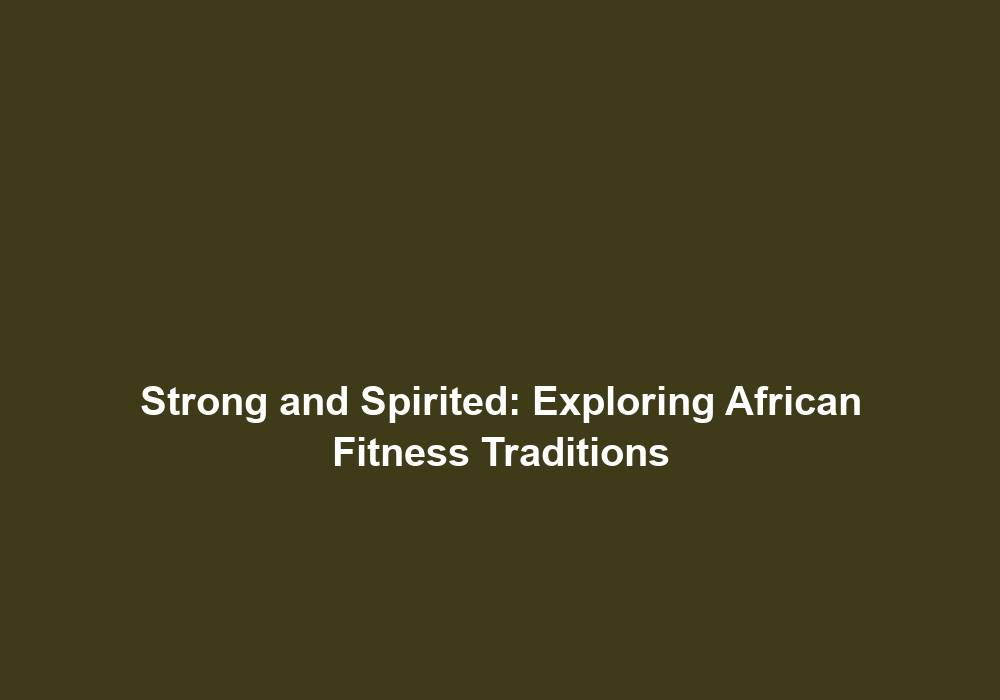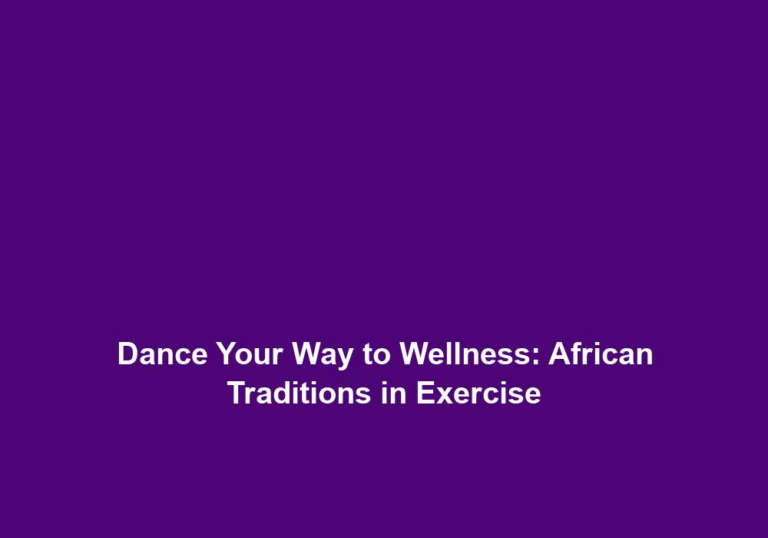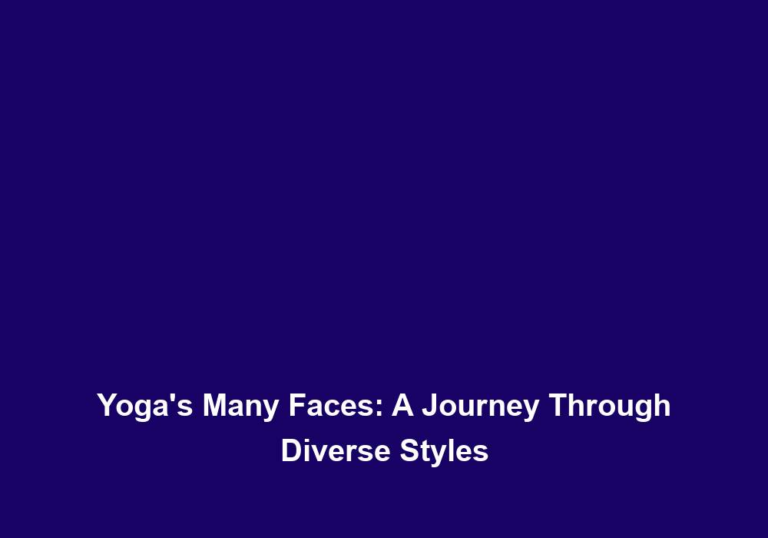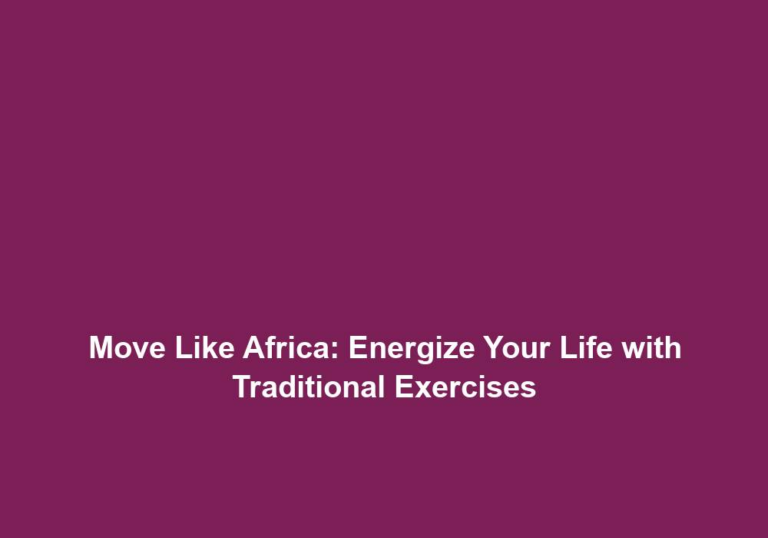Strong and Spirited: Exploring African Fitness Traditions
African fitness traditions have a rich and diverse history that spans centuries. These traditions not only promote physical health and well-being but also reflect the culture, values, and community spirit of various African societies. In this article, we will delve into the fascinating world of African fitness traditions, highlighting their unique characteristics, benefits, and significance.
Traditional African Fitness Practices
1. Capoeira
Originating from Angola, Capoeira is a unique Afro-Brazilian martial art that combines elements of dance, acrobatics, and music. It is characterized by its rhythmic movements, fluid kicks, and quick footwork. Capoeira not only enhances physical strength, flexibility, and coordination but also fosters teamwork, discipline, and self-expression. This dynamic practice is gaining popularity worldwide due to its energetic and interactive nature.
Capoeira provides a full-body workout that engages muscles from head to toe. The combination of dance-like movements and acrobatics challenges the body’s flexibility and coordination. The rhythmic nature of Capoeira also helps to improve cardiovascular fitness and stamina. Additionally, the practice of Capoeira promotes teamwork and discipline as participants engage in partner movements and learn to synchronize their actions. It also encourages self-expression through the incorporation of music and singing, allowing individuals to showcase their creativity. Overall, Capoeira not only offers physical benefits but also provides a platform for personal growth and cultural exchange.
2. Nguni Stick Fighting
Nguni Stick Fighting, also known as Donga or Nguni Stick Wrestling, is a traditional combat sport practiced by various Southern African communities. This intense martial art involves using long sticks as weapons to strike, block, and disarm opponents. It requires a combination of agility, strategy, and reflexes. Nguni Stick Fighting not only improves physical fitness and self-defense skills but also serves as a form of cultural preservation and celebration.
Nguni Stick Fighting provides a challenging and dynamic workout that targets multiple muscle groups. The swift movements and strikes involved in this martial art enhance agility, speed, and coordination. It requires quick reflexes and strategic thinking, making it an excellent way to sharpen the mind and improve cognitive abilities. Beyond its physical and mental benefits, Nguni Stick Fighting holds significant cultural value. By practicing this tradition, individuals not only engage in a physically demanding activity but also honor their heritage and contribute to the preservation of African culture. It serves as a reminder of the strength, resilience, and warrior spirit of the Southern African communities.
3. Maasai Jumping Dance
The Maasai Jumping Dance, a traditional East African ritual performed by the Maasai people, is both a celebration and a fitness practice. It involves a group of warriors forming a circle and taking turns to jump as high as possible, showcasing their strength and endurance. This dance not only strengthens leg muscles and improves cardiovascular fitness but also represents the vitality and bravery of the Maasai community.
The Maasai Jumping Dance is a physically demanding activity that requires exceptional lower body strength and endurance. The repetitive jumping motions engage the leg muscles and contribute to improved muscular power and stamina. The dance also serves as a cardiovascular exercise, as the warriors perform the jumps in a rhythmic and energetic manner. Additionally, the Maasai Jumping Dance holds cultural significance as it embodies the spirit and traditions of the Maasai people. It symbolizes their bravery, resilience, and unity as a community. Participating in this dance not only promotes physical fitness but also allows individuals to connect with the rich cultural heritage of the Maasai tribe.
4. Moringa Workouts
Moringa workouts have gained popularity in recent years due to the exceptional nutritional benefits of Moringa, a plant native to Africa. These workouts involve incorporating Moringa leaves, seeds, or supplements into fitness routines, such as yoga, Pilates, or strength training. Moringa is rich in essential nutrients, antioxidants, and anti-inflammatory compounds, making it a valuable addition to any workout regimen. These workouts not only enhance physical stamina but also boost overall health and well-being.
Incorporating Moringa into fitness routines offers a range of health benefits. Moringa is packed with essential nutrients, including vitamins, minerals, and amino acids, that support overall health and vitality. Its high antioxidant content helps to combat oxidative stress and inflammation in the body, promoting faster recovery from workouts and reducing the risk of chronic diseases. Moringa’s anti-inflammatory properties also contribute to improved joint health and mobility, making it particularly beneficial for individuals engaged in strength training or high-intensity workouts. Furthermore, Moringa provides a natural energy boost, helping individuals to sustain their performance during workouts. By incorporating Moringa into their fitness routines, individuals can optimize their physical performance and enhance their overall well-being.
Benefits of African Fitness Traditions
- Cultural Preservation: African fitness traditions play a vital role in preserving and transmitting cultural heritage from one generation to another. By practicing these traditions, individuals stay connected to their roots, honor their ancestors, and promote cultural diversity.
- By engaging in African fitness traditions, individuals actively participate in the preservation of their cultural heritage. These traditions embody the values, beliefs, and practices of African societies, ensuring that they are passed down to future generations. It also allows individuals to connect with their roots, fostering a sense of identity and belonging. Moreover, the practice of African fitness traditions promotes cultural diversity by showcasing the uniqueness and richness of different African communities. It serves as a reminder of the importance of preserving and celebrating cultural traditions in an increasingly interconnected world.
- Physical Fitness: African fitness traditions offer a holistic approach to physical fitness. The combination of movements, intense workouts, and rhythmic practices helps individuals build strength, endurance, flexibility, and coordination.
- African fitness traditions provide individuals with a well-rounded and comprehensive workout. The diverse movements and techniques involved in practices such as Capoeira, Nguni Stick Fighting, and the Maasai Jumping Dance target various muscle groups and improve overall physical fitness. These traditions focus on building strength, enhancing endurance, increasing flexibility, and improving coordination and balance. The intense nature of these practices also contributes to cardiovascular fitness, promoting a healthy heart and lungs. By engaging in African fitness traditions, individuals can achieve a balanced and functional level of physical fitness.
- Mental Well-being: Engaging in African fitness traditions goes beyond physical exercise; it also nurtures mental well-being. The sense of community, camaraderie, and cultural pride associated with these practices contributes to overall mental health and happiness.
- African fitness traditions create a supportive and inclusive community that fosters mental well-being. The group dynamics and teamwork involved in practices such as Capoeira and Nguni Stick Fighting promote social connections and a sense of belonging. The cultural pride associated with these traditions instills a sense of identity and self-confidence. Additionally, the rhythmic movements and music in African fitness traditions have a calming and meditative effect, reducing stress and promoting mental relaxation. Engaging in these practices allows individuals to find balance, release negative emotions, and enhance their overall mental well-being.
- Self-Expression: Many African fitness traditions incorporate elements of art, music, and dance, allowing individuals to express themselves creatively. This self-expression fosters personal growth, confidence, and emotional well-being.
- African fitness traditions provide a platform for individuals to express themselves creatively and authentically. Practices such as Capoeira and African dance workouts combine physical movements with music and rhythm, allowing individuals to showcase their unique style and creativity. This form of self-expression promotes personal growth, as individuals gain confidence in their abilities and develop a deeper understanding of their bodies. It also serves as a means of emotional release and allows individuals to connect with their emotions on a deeper level. By engaging in African fitness traditions, individuals can tap into their creative potential and experience a greater sense of emotional well-being.
- Connection to Nature: African fitness traditions often take place outdoors, allowing participants to connect with nature and reap the benefits of fresh air, sunlight, and natural surroundings. This connection promotes a sense of grounding, peace, and harmony.
- African fitness traditions embrace the natural environment, offering individuals the opportunity to connect with nature. Practices such as the Maasai Jumping Dance and outdoor Capoeira sessions take place in open spaces, allowing participants to breathe in fresh air, soak up sunlight, and appreciate the beauty of natural surroundings. This connection to nature promotes a sense of grounding and tranquility, reducing stress and promoting overall well-being. It also encourages individuals to develop a deeper appreciation for the environment and the importance of preserving it. Engaging in African fitness traditions outdoors provides a holistic experience that nurtures the body, mind, and spirit.
Incorporating African Fitness Traditions Today
With the growing interest in diversity and cultural appreciation, African fitness traditions have found their way into contemporary fitness practices. Gyms, fitness studios, and communities around the world are embracing and incorporating these traditions into their offerings. Here are some ways to incorporate African fitness traditions into your fitness routine:
- Join a Capoeira Class: Seek out Capoeira classes in your area to learn this dynamic martial art, experience the vibrant culture, and improve your physical fitness.
- Joining a Capoeira class allows individuals to learn from experienced instructors and immerse themselves in the vibrant culture of this Afro-Brazilian martial art. These classes provide a structured environment where participants can develop their skills, improve their physical fitness, and experience the energetic and interactive nature of Capoeira. It also offers an opportunity to connect with a community of like-minded individuals who share a passion for this unique tradition.
- Explore Stick Fighting Workshops: Look for workshops or clubs that teach Nguni Stick Fighting to gain self-defense skills, enhance agility, and connect with African heritage.
- Participating in Stick Fighting workshops allows individuals to learn the techniques and strategies of Nguni Stick Fighting from skilled instructors. These workshops provide a safe and controlled environment where participants can develop their self-defense skills, improve their agility, and experience the intensity of this traditional combat sport. It also offers a chance to connect with African heritage and appreciate the cultural significance of Nguni Stick Fighting.
- Try African Dance Workouts: Many fitness centers now offer African dance workout classes that fuse traditional moves with contemporary fitness routines. These classes provide an opportunity to engage in joyful, rhythmic movement while improving cardiovascular fitness.
- African dance workout classes combine traditional African dance moves with modern fitness techniques, offering a dynamic and enjoyable workout experience. These classes are designed to improve cardiovascular fitness, coordination, and flexibility while allowing participants to immerse themselves in the vibrant and rhythmic world of African dance. They provide a fun and energetic atmosphere where individuals can express themselves through movement and experience the joy of dancing. Trying African dance workouts not only benefits physical fitness but also allows individuals to embrace the cultural aspects of African traditions.
- Incorporate Moringa into Your Diet: Consider adding Moringa leaves, seeds, or supplements to your diet to reap the nutritional benefits and enhance your workouts. Consult a healthcare professional for guidance.
- Incorporating Moringa into your diet can enhance your overall health and well-being. Moringa leaves, seeds, or supplements can be added to various dishes, smoothies, or teas to boost nutritional content. Its rich antioxidant and anti-inflammatory properties can support post-workout recovery, reduce inflammation, and improve immune function. However, it is important to consult a healthcare professional before incorporating any new supplement into your diet to ensure it aligns with your individual needs and health conditions.
In conclusion, African fitness traditions offer a unique and culturally rich approach to physical fitness and well-being. These traditions promote physical strength, mental wellness, self-expression, and cultural preservation. By embracing and incorporating African fitness practices into our lives, we not only improve our health but also celebrate the diverse heritage of the African continent.







